PRESERVING A MILITARY LEGACY FOR FUTURE GENERATIONS
The following Reflections represents HM2 Steven Bowyer’s legacy of his military service from 1967 to 1973. If you are a Veteran, consider preserving a record of your own military service, including your memories and photographs, on Togetherweserved.com (TWS), the leading archive of living military history. The following Service Reflections is an easy-to-complete self-interview, located on your TWS Military Service Page, which enables you to remember key people and events from your military service and the impact they made on your life. Start recording your own Military Memories HERE.
Please describe who or what influenced your decision to join the Coast Guard.

Upon graduation from High School in 1966, the draft was in place. I, however, wanted to be able to choose for myself rather than the government. I had no idea at the time which was the right branch of the Armed Services to join, and I did some research and decided it would be the United States Coast Guard. A very good friend of mine who I graduated with had moved to Florida, and I hoped to be stationed on a ship near him. If I joined the service, I discovered that the possibility of being stationed in Florida was an option.
I had a total of 6 years in the USCG. I had no idea that I would become a Hospital Corpsman which would eventually lead me to the path of being a Respiratory Therapist, a Registered Nurse with multiple Board Certifications in many areas. They were in Medical, Surgical, Rehabilitation, Infection Control, Administration and Dementia, and Alzheimer’s care.
Whether you were in the service for several years or as a career, please describe the direction or path you took. What was your reason for leaving?

Joining the USCG was a very smart decision for my career in the medical field. I served six years and gained valuable experience as a Hospital Corpsman during that time. The Coast Guard does not have a school, and I was sent to the Navy School in San Diego, California. Upon graduation, I was transferred to the Coast Guard Academy Hospital in New London, Connecticut, for advanced training. Upon graduation, I was then returned to Governor’s Island Hospital. During my time from late 1968 through May of 1970, I gained experience that would assist me at my last duty station on a SAR unit in Louisiana. The physicians stationed at the hospital were from the United States Public Health Service. Governor’s Island was like a small city with nearly 5000 members and families of the USCG.
Working with these physicians was a very valuable experience that trained me in triage, actually minor surgery (we were taught how to suture minor wounds), which you are not allowed to do in the private sector. Additionally, we were given detailed instructions on various treatments, including medication management and identifying medical diagnoses. It was as though we became physician extenders. Military medicine is different from civilian medicine, especially in my opinion, during wartime. The physicians took us under their wings to teach and prepare us for cases coming to our sick bay (triage area) before being sent to see them. This triage area helped with their job since we were sometimes overwhelmed with the number of people and civilians who came for care at the hospital. I made second class in May of 1970 and immediately received orders. When I first heard of the orders, it appeared I was being transferred to the CGC Dallas that was home-ported in NY, but that soon changed, and the final orders came down that I would be going to a SAR station in Louisiana. I discovered I would be part of a Group Command and the first Hospital Corpsman in that command. When I arrived, I had my work cut out for me, setting up a sick bay for the base. I could never imagine how much work was involved in my grade. Besides being the only Corpsman in the group, I had additional duties to go to the attached lighthouse and LORAN station in the group that was located along the coast of Texas.
Additionally, to my surprise, I had to pull duty as the Officer of the Day on the weekends when the Group Commander and Executive Officer were off. My Corpsman duties never stopped with daily sick call and SAR missions. I cannot remember how many I went on. Some were okay, and some were a “train wreck.” On my last several days before my discharge at Grand Isle, I had to go out on a very serious rescue of a crew who lost his leg in an accident with an anchor. I cannot describe the event, but had I not acquired all of the training at Governor’s Island, I probably would not have saved this person from dying. The experience I gained was invaluable. After I left the service, I started Respiratory Therapy school, graduated, became a Registered Nurse, and spent almost ten years as a Trauma Nurse. That was not my total career as a Registered Nurse, but the service with the USCG made me decide on the profession I wanted upon discharge.
My reason for leaving the Coast Guard was that I was getting married, and the pay at that time was not sufficient to raise a family.
If you participated in any military operations, including combat, humanitarian and peacekeeping operations, please describe those which made a lasting impact on you and, if life-changing, in what way?
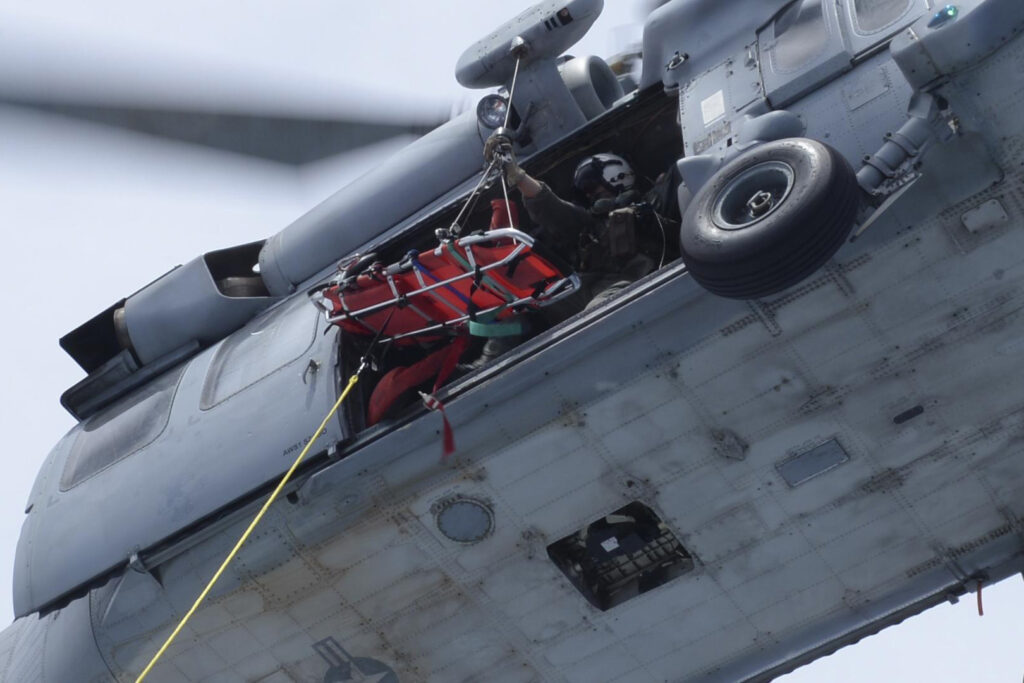
I only had the opportunity to provide humanitarian care to my fellow members of the Coast Guard. I was the only Corpsman on the Alabama coast to Texas on my last duty station. I was on many search and rescue missions providing care as needed to multiple civilians. I provided additional care to the civilians near my previous duty station since the nearest hospital for care of any type was 50 miles away. Being in the Coast Guard served the population as “always ready.”
Did you encounter any situation during your military service when you believed there was a possibility you might not survive? If so, please describe what happened and what was the outcome.

While on a mission in the Gulf of Mexico, I and others attempted to assist a swimmer who got stranded from his family during a violent storm and was floating in the Gulf. Attempts were made to swim to his rescue, which seemed impossible. During the rescue, I got pulled by the under tow out into the Gulf before I could come to his rescue. I only had my life jacket and no means of communication. I was not even sure that my fellow sailors were aware of where I had drifted to. It seemed I lost all track of time and was beginning to believe that maybe no one would come to my rescue. What seemed to be a very long time was when I saw a rescue vessel from my station coming to my rescue on the horizon. I was thrilled they did not forget me and came to my rescue.
Of all your duty stations or assignments, which one do you have fondest memories of and why? Which was your least favorite?

My Fondest was at the Hospital in New London at the academy.
My least favorite was my last duty station and how the Group Commander treated me.
From your entire military service, describe any memories you still reflect on to this day.
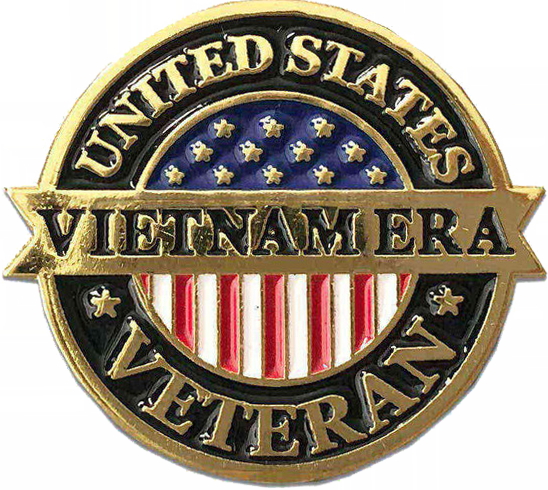
I was proud to have provided my service to the USCG for six years during the Vietnam Era. I stand proud today to say that I made the right choice in joining such a prestigious military service.
What professional achievements are you most proud of from your military career?
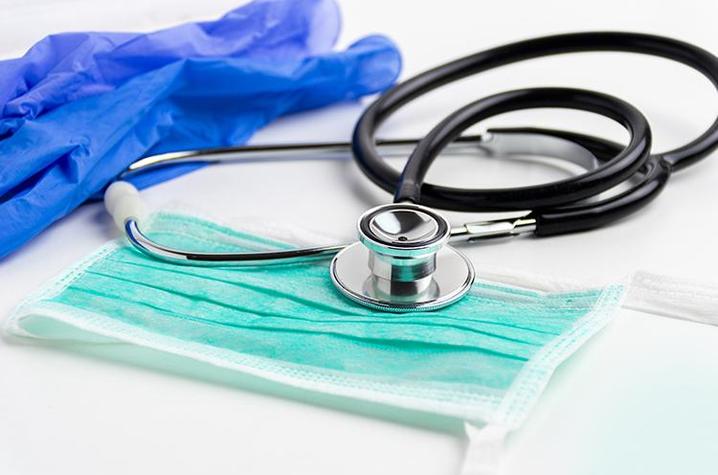
I was selected to go and become a Hospital Corpsman which allowed my career growth in the private sector.
Of all the medals, awards, formal presentations and qualification badges you received, or other memorabilia, which one is the most meaningful to you and why?

I am proud of all I received.
Which individual(s) from your time in the military stand out as having the most positive impact on you and why?
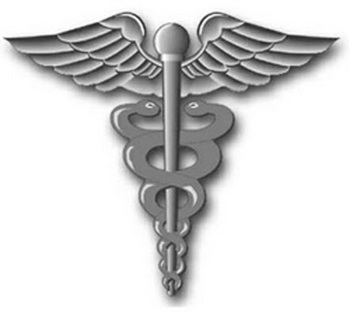
Bruce Rimmer, a dental technician at Governor’s Island, encouraged me to go to Hospital Corpsman School. He remained a Dental Technician at Governor’s Island until his discharge in 1971. He later joined the Air Force, which assisted him in becoming a Dentist. He had a practice in Bakersfield, California, for many years. I believe he is retired, and if not for him, I would not have succeeded without his influence.
List the names of old friends you served with, at which locations, and recount what you remember most about them. Indicate those you are already in touch with and those you would like to make contact with.

I already discussed one of my best friends, Bruce Rimmer, who encouraged me to go to school. One of my other good friends was Jerry Banks, PO2, who I served with at USCG Station Grand Isle. I have not made touch with either of these gentlemen.
Can you recount a particular incident from your service which may or may not have been funny at the time but still makes you laugh?
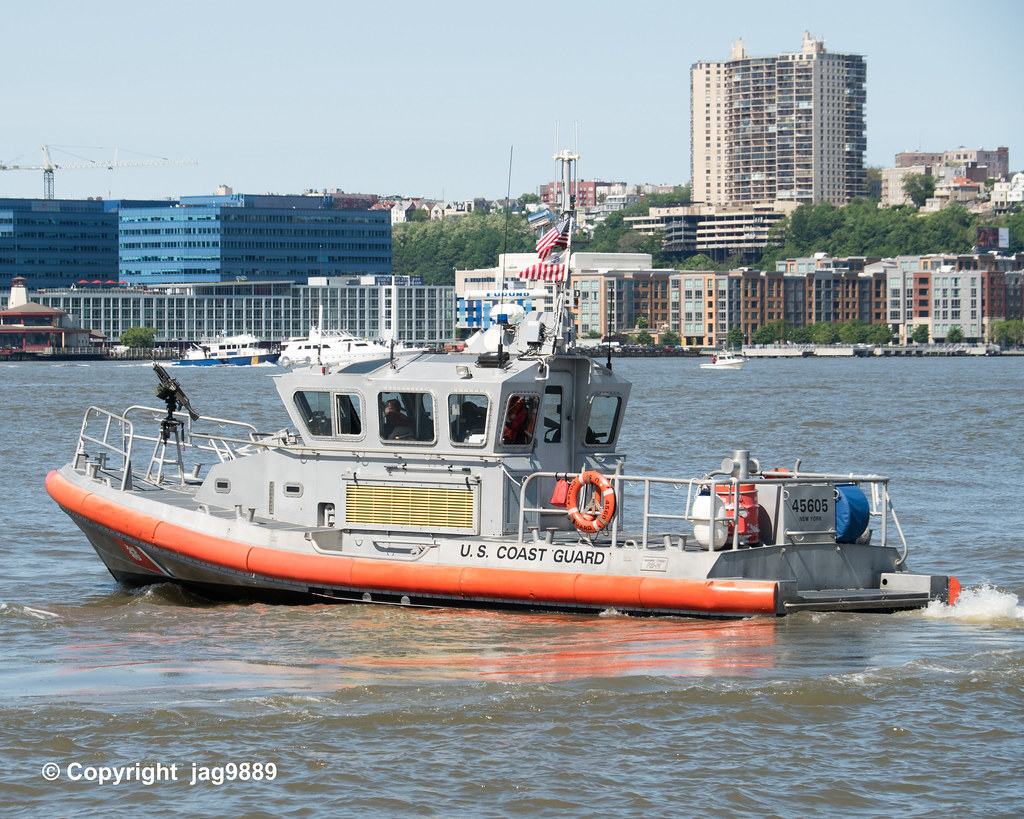
On my first duty station at the Coast Guard Training Station at Governor’s Island, NY, I had just been appointed to the Shore Patrol. I was new to the shore patrol, and we were assigned to the base and also the Ferry Boats that took service men, women, and civilians from the base to lower Manhattan, NY. It was during the Vietnam War Era, and everyone was on edge regarding any type of attack, even though the war was 8000 miles or more from NY. One of the men was acting strange on the ferry, and I thought to myself, what is he doing, and what were his intentions? He first said he was going to do some harm, but all of a sudden, the harm was to jump overboard off the ferry into the Hudson River. This may not seem funny to some, but to me, after sorting all of the facts and getting him back on board, I had to place handcuffs on him. The integration led to the fact that he thought if he threw himself into the Hudson River, he would be given a section 8 and be discharged. The funny thing was many of us thought he may have wanted to harm the ferry and cause it to sink based upon our suspicion. It may not be funny to some, but looking back at the incident, he was trying to get out of the service and thought this would be a funny situation. He was a good swimmer, and he would never have drowned; just his way of getting attention. When I recall the incident, it was not really funny at first, but later I see how he turned an incident into a funny way just to draw attention to get out of the service.
What profession did you follow after your military service, and what are you doing now? If you are currently serving, what is your present occupational specialty?
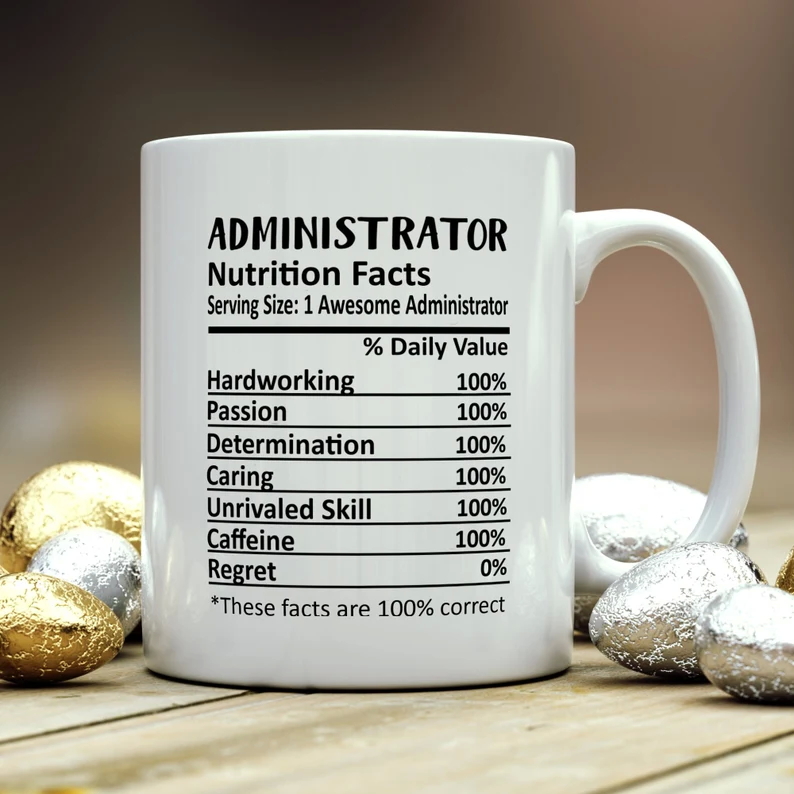
Upon discharge, I completed a 2-year school and became a Respiratory Therapist.
Then I completed a 4-year nursing program to become a Registered Nurse. I practiced as a Respiratory Therapist for 20 years, and I am still practicing as a Registered Nurse.
I went back to school and became a licensed Nurse Home Administrator and continue to practice today for 24 years.
In what ways has serving in the military influenced the way you have approached your life and your career? What do you miss most about your time in the service?
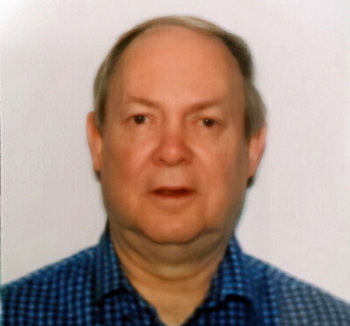
I personally believe my time in the service made a man of me and fashioned me into what I am today. I don’t really miss my time in the service; I wish when I had the opportunity to go back in, in 1988, I would have made the leap. Too late now.
Based on your own experiences, what advice would you give to those who have recently joined the Coast Guard?
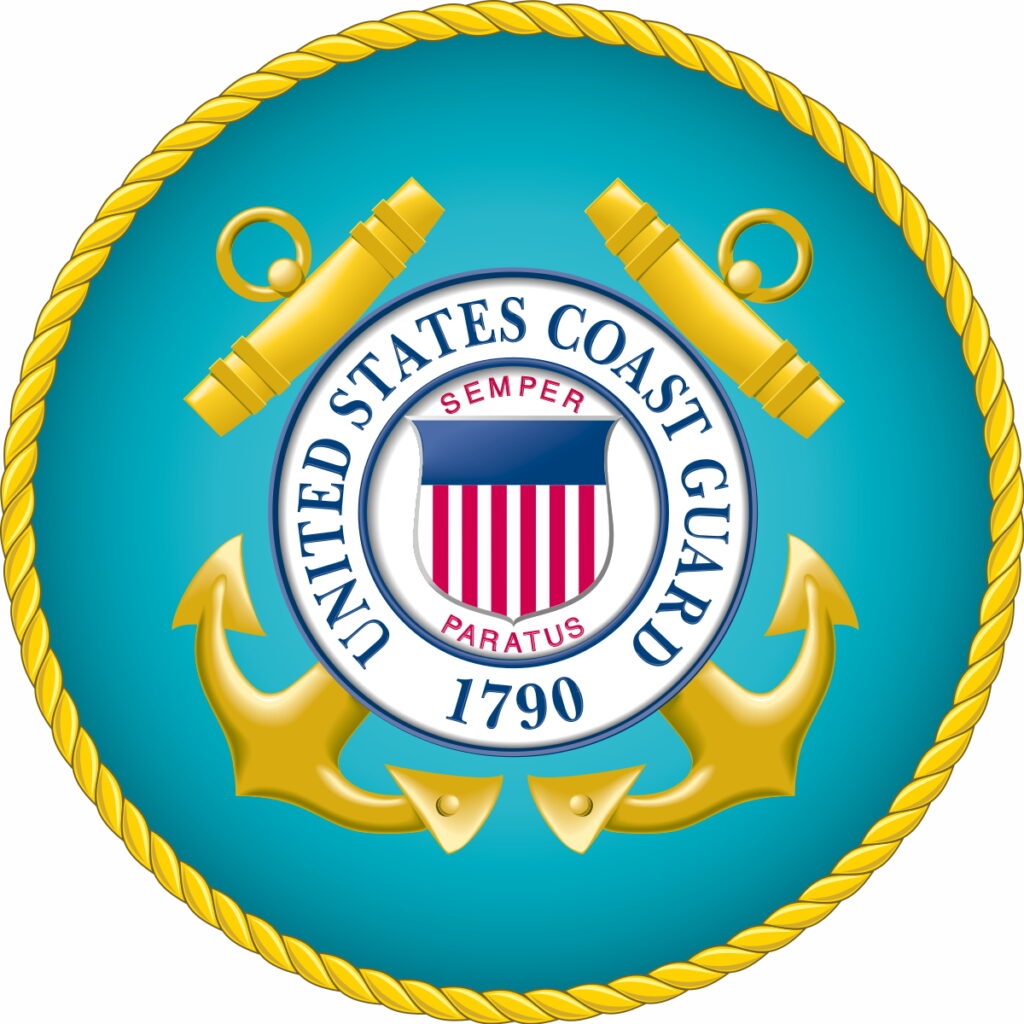
Very rewarding. I should have made a career; however, I just never followed through.
I suggest you take advantage of all the Coast Guard service offers. But remember to give as much as you receive.
In what ways has togetherweserved.com helped you remember your military service and the friends you served with?
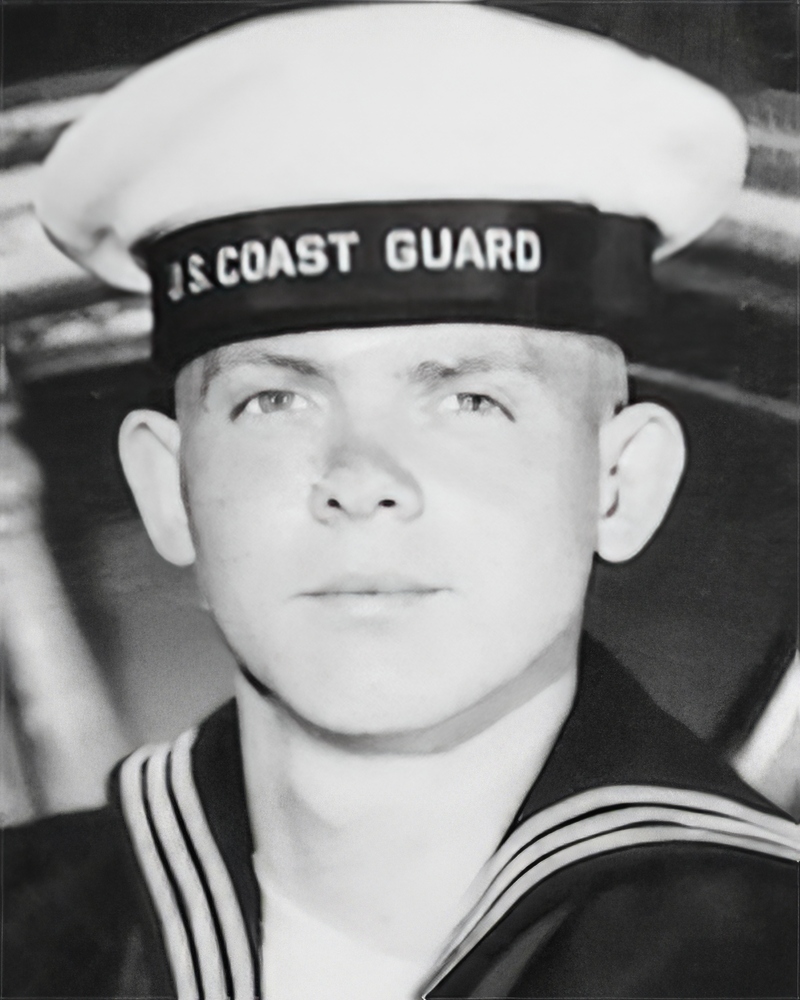
I didn’t know TWS existed. It has given me a platform where I can record my service and record my memories.
I hope some people I have served with will join and reach out. It would be wonderful!
PRESERVE YOUR OWN SERVICE MEMORIES!
Boot Camp, Units, Combat Operations
Join Togetherweserved.com to Create a Legacy of Your Service
U.S. Marine Corps, U.S. Navy, U.S. Air Force, U.S. Army, U.S. Coast Guard
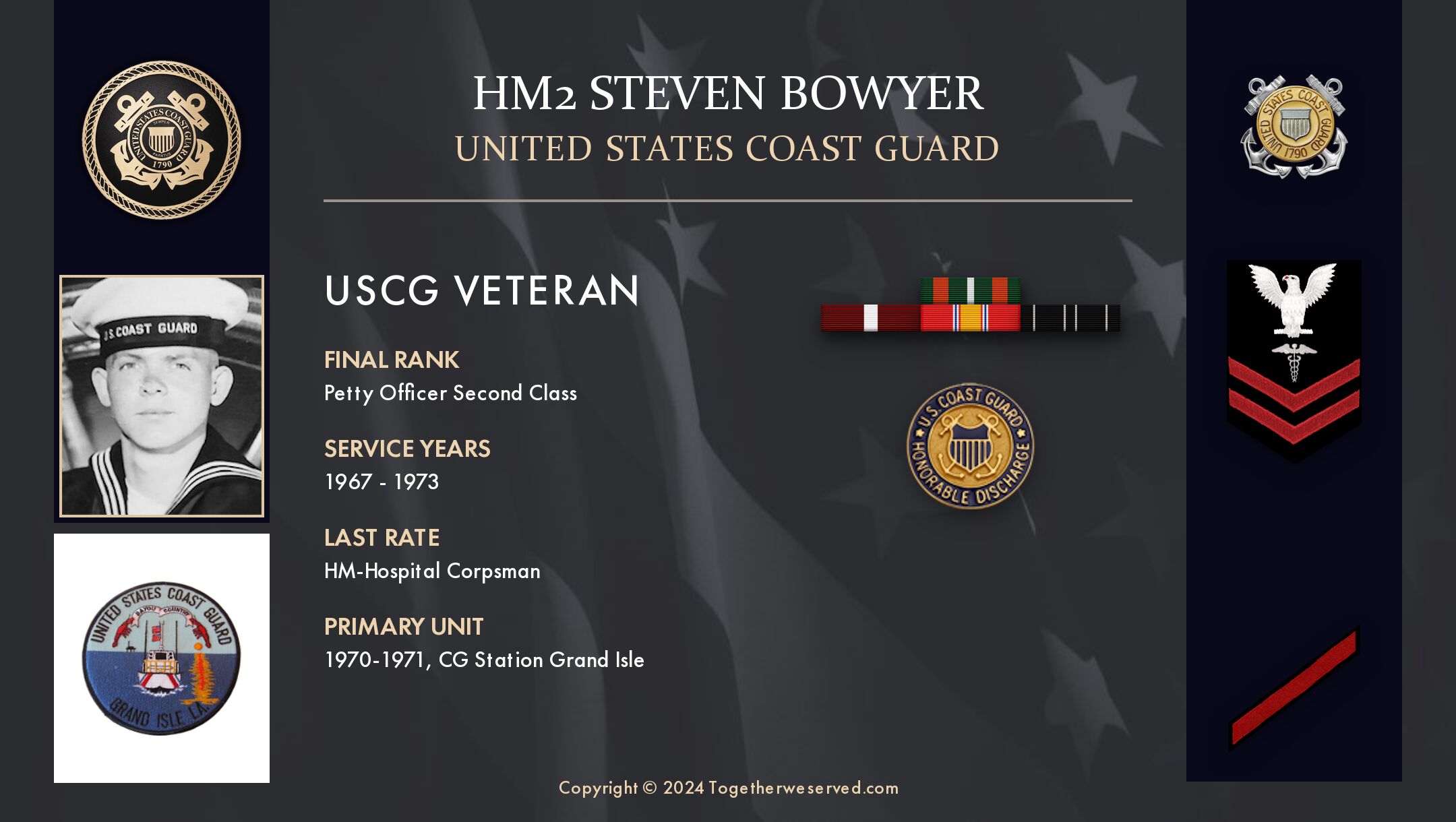
0 Comments